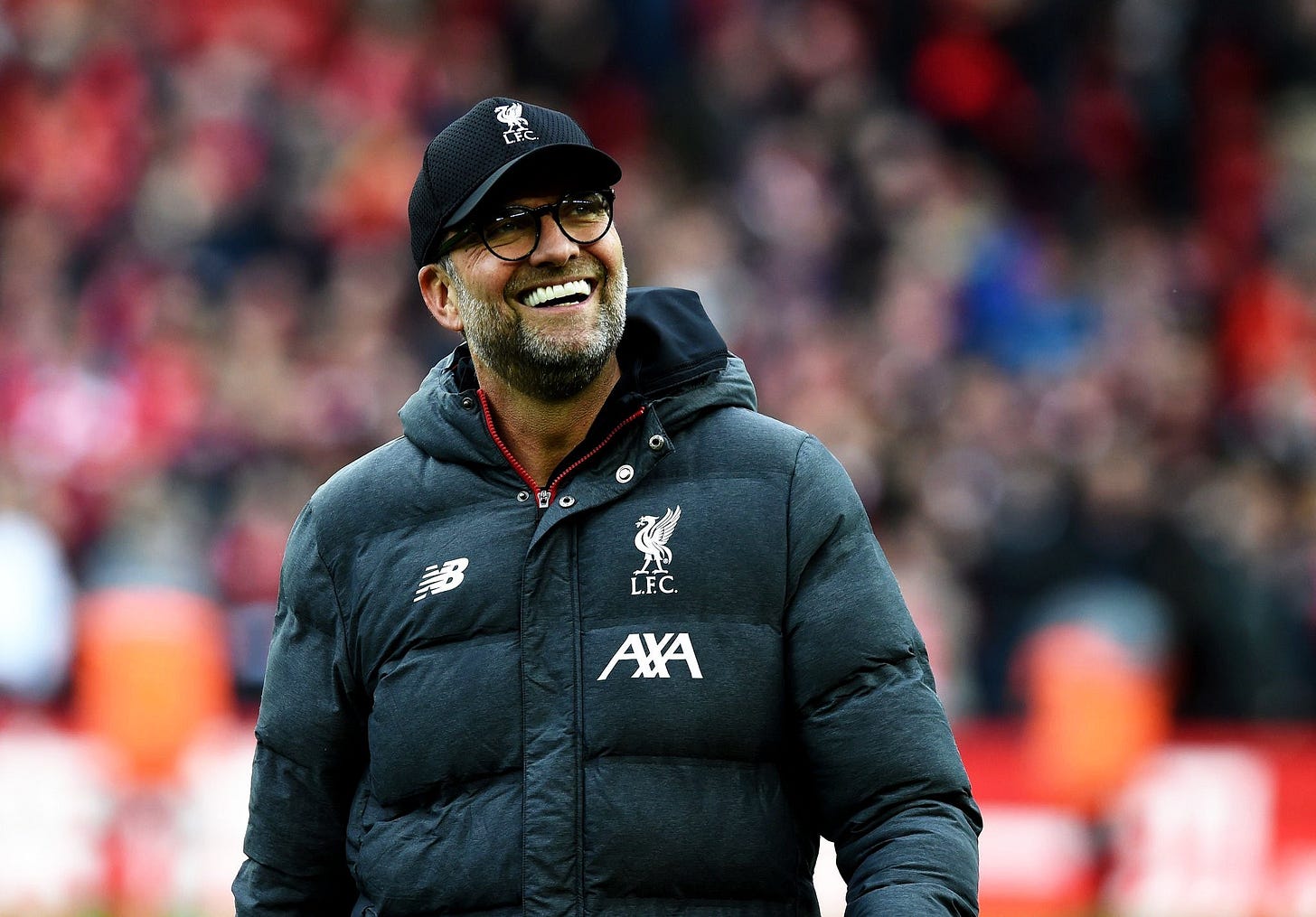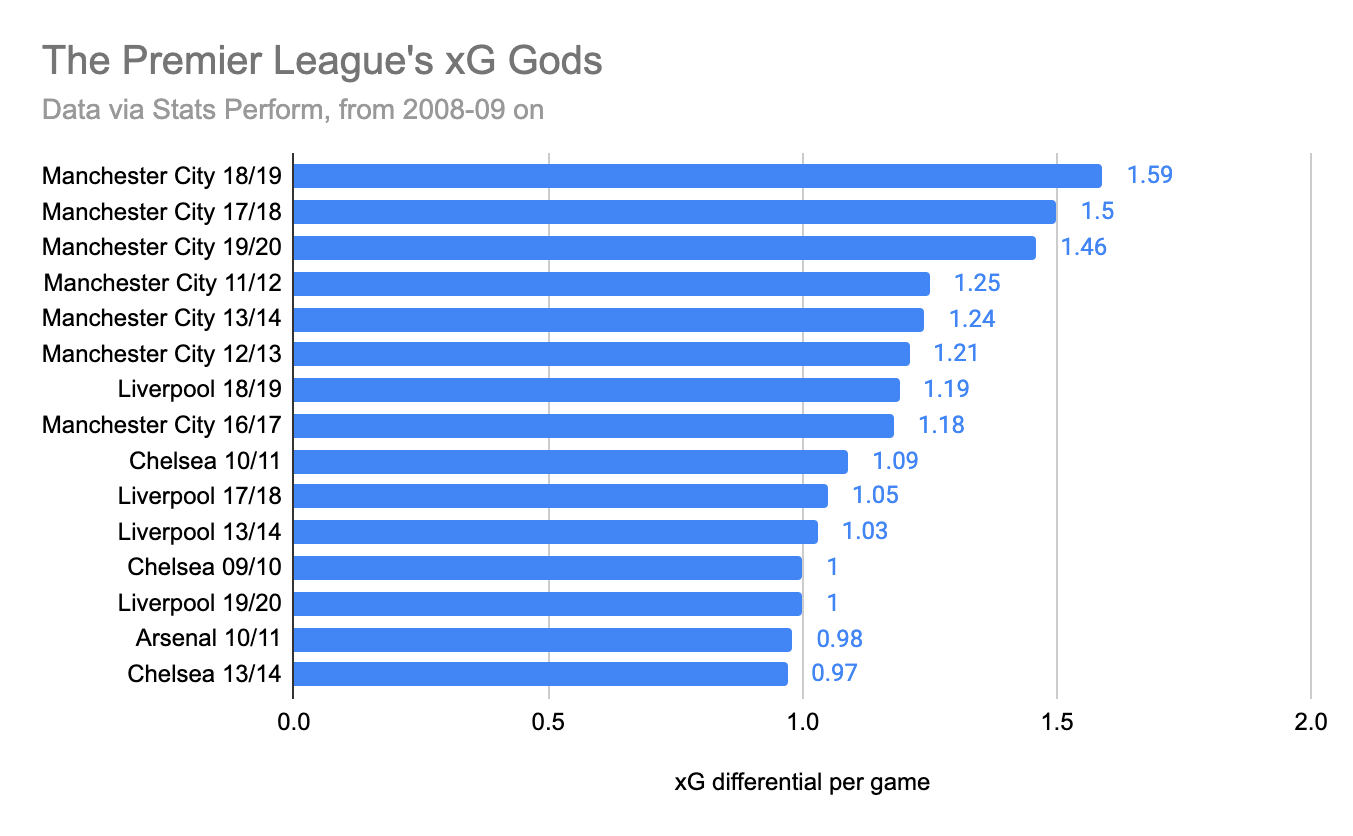How Good Is Liverpool?
With the team's first Premier League title just six points away, let's compare Jurgen Klopp's side to the other great teams in England and elsewhere in Europe

Black lives matter. This document has an exhaustive list of places you can donate. It’s also got an incredible library of black literature and anti-racist texts. Donate, read, call, and email your representatives. We’re all in this together.
To novice Premier League fans, newcomers, and experts alike, the most obvious and immediately accessible piece of information is this: Wow, Liverpool have a lot more points than everyone else. To be precise, 22 more points than everyone else. The gap between first and second is wide enough to swallow Norwich City’s season whole. If you gave City all Norwich’s points, they’d still be in second place.
So, just how good is Liverpool?
Well, I’m glad you asked — and interrupted. Saves me from drawing that intro out too far.
Well, well, we both really like using “well” as a rhetorical crutch.
Almost like we’re the same person, huh?
The concept of a fixed self is a construct, especially exploitable by capital in the age of the personal brand. Truth is: We’re all constantly changing. Even if the same person was writing the questions and the answers, his molecular and spiritual existence will have shifted ever so slightly by the time he finished writing the question he would actually be a slightly different person by the time he answered it.
Er, what was your question again?
How good is this Liverpool team?
Here’s how the betting markets -- the best predictors of what’s to come -- see it.

Your spreadsheet cut off. Ever heard of Tableau? Python? C’mon. What number is that up there?
Sporting Index projects Jurgen Klopp and Co. to finish on exactly 100 points, which would tie Manchester City for the highest total in Premier League history. The folks over at FiveThirtyEight put their median projection one point higher at 101.
Let’s go beyond that. Since the start of the 2008-09 season, these are the ten best teams from Europe’s Big Five leagues (England, Spain, Germany, Italy, and France) at doing the thing that everyone is trying to do: win as many points possible.

Much better presentation.
Thank you. Just for reference, the average PPG number among all teams in the Big Five since 2008 is 1.37 points per game. Liverpool, as of now, are the only team to double that. One other note from the chart: Pep Guardiola, the current Manchester City manager, was the manager for HALF of these teams -- both Man City teams, two of the three Bayern groups, and one of the Barcelona iterations.
OK, so I’ve done some math here. I noticed a couple things. For starters, those bettors see Liverpool winning 18 points from the final nine games. That’s 2.00 points per match -- or significantly less than the average listed in the chart above. On top of that, if the gap between first and second is 22 points, but the projected final-season gap is 18 points, then those self-same bettors are projecting Manchester City to win four more points -- 22 total, 2.44 per game -- than Liverpool over the final nine matches. What’s going on there?
To steal one of your phrases: a couple things. One of the benefits of having so much time off is that teams with injured players didn’t have to play games while those players were injured. And for some lucky clubs, those injured players are now healthy. Among players with at least 3000 minutes of game time since the start of last season, Aymeric Laporte has the best plus-minus rate of anyone in the Premier League. Per Stats Perform, City are plus-1.98 for every 90 minutes their star center back plays. There are all kinds of false signals in a number like that, but the point is: City are better with Laporte in the team than without him.
Laporte, however, has only played 573 minutes so far this season. He’d been out since August, returned to limited action in February, and then went off injured against Real Madrid in City’s final game before play was paused. The 26-year-old returned on Wednesday against Arsenal, the team didn’t allow a shot on target, and they won, 3-0.
Compared to Liverpool, City’s main issue this season has been their inability to prevent goals. They’ve scored 71 goals -- most in the league -- but they’ve allowed 31 goals, which is just fifth-best and is 10 more than Liverpool’s league-leading 21. The return of Laporte makes City better in a way few other players would.
OK, but you said “a couple things”.
I’m getting there, all right?
The average NBA team takes 89 shots per game. Only two teams in the Enlightened Era of the Premier League (Stats Perform data goes back to the 08-09 season) have even attempted at least 20 shots per match: Chelsea in 08-09 and Chelsea in 09-10. On top of the scarcity of attempts, there’s also the difficulty. The average attempt in the NBA goes in around 46 percent of the time; in the EPL, the conversion rate is all the way down at about 10 percent. The fact there are so few attempts and that 90 percent of them don’t end up scoring points makes soccer an inherently random sport that can produce outlying outcomes -- especially from game to game but also from a 29- or 38-game selection.
Just take goal differential. Here’s the top 10 since 08-09:

It’s no coincidence that both last season and 2011-12 -- AGUERROOOOOOOOOOO -- had memorable title races. Each season included two of the best Premier League sides in recent memory battling it out until the last day. More relevant to our discussion, though, is the presence of Liverpool in eighth place on this list. The fact that they’re winning more points than any team in Europe since ... ever but doing so by outscoring opponents at just -- “just” -- the eighth-best rate in England over that same span suggests that they’re scoring and not conceding at all the right times.
Liverpool have won 13 games by one goal -- three behind Manchester United’s record of 16, set in 08-09 and then matched again in 12-13. But that’s actually not a huge outlier. When a team wins a lot, that team is also probably going to have a lot of one-goal wins. Per research by the analyst Mark Taylor, the average PL team gets 41 percent of its points from one-goal wins. For Liverpool this year, that number is 48 percent -- up above the average but not wildly high either.
Same thing goes for expected goals, which Stats Perform defines as such: “the quality of a shot based on several variables such as assist type, shot angle and distance from goal, whether it was a headed shot and whether it was defined as a big chance.” Per that metric, here’s the top 15 in the Premier League since 08-09:

I’ll let you figure out which club is owned by the royal family of Abu Dhabi. Now, assuming Liverpool go on to clinch their first-ever title, of these 15 teams, just six actually won the title. However, xG is meant more as a predictive measure rather than to tell us what actually happened. And it also shows that soccer is so often decided by how accurately a player happens to kick a ball, whether a defender is able to get it a foot, what direction the ball deflects after the defender gets his foot in, and whether or not a keeper can get in the way. All of the intricate work that creates the chance in the first place can be vindicated or destroyed by the tiniest of margins, but the intricate work is also the thing that’s most repeatable.
So, they’re lucky?
Not exactly, or at least, not totally. One more chart, and then I’m done with the charts, I promise. Expected goals doesn’t take into account where the shot ended up on the goal frame; an empty-net tap-in that gets skied over the bar will still get counted as something like 0.9 xG. However, xGOT (xG on target) does. Think of it as a combo of the quality of chances a team creates and concedes plus what they and their opponents then do with those chances. The data here only extends back to the 13-14 season:

Outside of the teams with the two highest point totals in league history, this year’s Liverpool have been better than everyone since 13-14 at putting dangerous chances in dangerous areas on the goal frame and then preventing their opponents from doing the same on the other end.
Did something change since 2017-18?
Given the team’s efficiency on set plays and its world-class attacking trio of Mohamed Salah, Sadio Mane, and Roberto Firmino, it’s no surprise that Liverpool’s shots get a boost in quality from their finishing, but the real difference comes at the other end of the field.
In 2017-18, Liverpool’s xG and xGOT conceded were roughly the same, but last year they saved about 0.20 goals per match based on where their opponents’ shots ended up, and this year they’re saving about a half of a goal per game. Part of that is luck; just go back and watch the finishing of Watford’s Ismaila Sarr in the first match against Liverpool this season and compare it with the second one. That’s got nothing to do with anything that Liverpool get credit for. But more broadly, the fact that it’s happened in two straight seasons suggests that Liverpool are doing something that makes their opponents’ shots less likely to end up in the net.
Last year and this year, of course, are Virgil Van Dijk’s first two full seasons with the club. Liverpool are actually conceding more shots this season -- and last season -- than they did in 17-18, but the average xG of each attempt is significantly lower. With VVD in the side, LFC seem way more comfortable dealing with the opposition’s presence in their defensive third, and a better positioned backline seems like it’s either blocking more dangerous shots, forcing more toward the corners, or funneling more attempts toward the center of the goal frame. Klopp’s increased reliance on a more workman-like midfield trio, concerned mainly with defensive positioning and keeping possession, coincides with the decrease in goals allowed. Their attacks have become slower and more deliberate over the past two seasons, they have more possession, they’re working the ball into the penalty area more often, and they’re winning the ball higher up the field -- all of which could also help the defense remain organized and be less vulnerable when the ball gets turned over
Then, on top of all that, they’ve got Alisson in goal, who’s one of the best in the world at stopping the shots, no matter where they end up on the goal frame.
Liverpool have built a deep roster of players who are mainly in their peak years and who have executed near-flawlessly at the business ends of the field for almost two straight seasons. Some of that is luck, some of it is strategy, some of it is internal improvement, and some of it is just a squad of talented players having their best seasons all at the same time.
So, basically you’re telling me that Liverpool have built a great team that controls nearly every game they’re in, and their ability to execute on the margins -- and their opponents’ inability to do the same -- has pushed them up toward a record number of points that will be hard to repeat next season?
Pretty much! It’s just like every other team that sets a record, or even comes close to doing so. After all: If it were easy to repeat, it wouldn’t be a record.
All stats are updated as of Friday morning.


